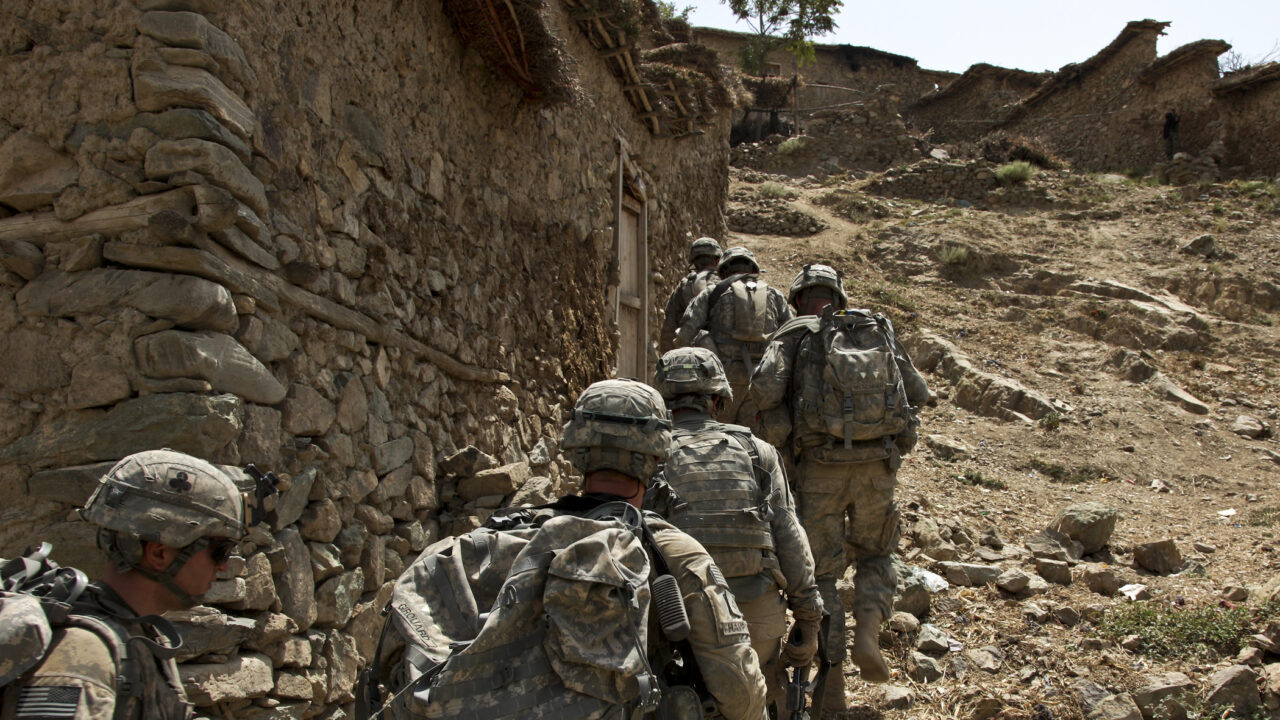The Afghan tragedy and the age of unpeace
The end of the US-led “forever war” in Afghanistan will not bring peace, because the methods that countries use to attack each other have changed. The world has entered a new age of perpetual competition among powerful states
The images of desperate Afghans scaling the perimeter fence at Kabul’s airport in an attempt to flee Taliban rule provide a heartbreaking record of our geopolitical moment. The brutal way in which the West’s former allies in Afghanistan are being left to their fate encapsulates the determination of US President Joe Biden’s administration to shed old international commitments as it embraces a new strategy.
There is much to criticise about the United States’ hasty withdrawal from Afghanistan, not least the lack of concern for the rights of Afghan women and girls, intelligence failures, and the absence of planning. But underlying many of the critiques is an unshakeable nostalgia, even grief, at the passing of an era. The US-led intervention in Afghanistan that began 20 years ago was the last vestige of a different world, defined by the quest for a liberal international order and the stated mission of bringing democracy and the rule of law to far-flung regions. Many in the West who attack Biden’s policy are in fact upset about the return of brutal geopolitical competition.
To understand Biden’s decision, we need to grasp the essence of this new era. The same globalising forces that brought us together when the Western mission in Afghanistan began are now driving us apart. Global supply chains, mass migration, and instantaneous information flows have accompanied soaring inequality, fuelling an epidemic of envy as people everywhere compare themselves to the world’s most privileged. These forces have helped foster a politics centred around grievances, identity, and a backlash against internationalism, epitomised by former US President Donald Trump but repeated in various guises around the world.
In this context, any US president must heed the domestic mood – a potent combination of “America First” sentiment and widespread distrust of elites – favouring withdrawal from foreign entanglements. Americans want their government to re-establish control in the face of the impersonal forces of interdependence, and no longer accept spending blood and treasure on distant missions to stabilise the world when they feel that the home front is so beset with problems.
Biden faces a new world in which countries attack each other by weaponising the very things that connect them. In the last few decades, we removed walls and borders, and wove a worldwide web that links people and countries together. But great-power politics now resemble a loveless marriage: the partners loathe one another but are unable to get divorced. With no children or dog to use to hurt each other, vindictive geopolitical partners turn to trade, finance, migration, pandemics, climate change, and the internet.
Such connectivity conflicts have become common. Some countries withhold access to trade, face masks, vaccines, global finance, or minerals. Others resort to cyber attacks or disinformation, or weaponise cross-border refugee flows. These modern methods do not meet the textbook definition of war, but they are killing and affecting far more people than armed conflict.
Biden’s determination to make the US competitive in this new era stiffened his resolve to exit the previous one.
Thus, the end of the “forever war” in Afghanistan will not bring peace. The Taliban used their control of information to persuade their domestic enemies to surrender without fighting. The massive predicted migration flows from Afghanistan will provide a rich target for Belarus and other states that want to undermine Western democracies, with state-sponsored online trolls stoking fear and sowing division. At the same time, the US will try to re-establish its sway over Afghanistan by manipulating aid flows and access to the dollar.
This is not war as we knew it, but it is not peace, either. Rather, the world has entered an age of unpeace, or perpetual competition among powerful states, with the US-China rivalry at its core. The Biden administration claims that the new frontier of freedom lies less in the ungoverned spaces of Afghanistan than in control of the global economy, infrastructure, artificial intelligence, and technology. It is Biden’s determination to make the US competitive in this new era that has stiffened his resolve to exit the previous one.
Biden’s next task is to build an alliance that can manage the age of unpeace. He has begun poorly. Many governments committed forces to Afghanistan in order to ingratiate themselves with the US, but justified their engagement to themselves and their citizens with reference to the universal values and liberal order that America claimed to support. They will not quickly forget such a rapid shift in US priorities, nor easily erase the images of American incompetence in Kabul.
America cannot lead in the future as it did when it was the world’s only superpower. It will need alliances that are based around the weapons of connectivity and less focused on military power. For European states, this is both an opportunity and a challenge. In Afghanistan, they outsourced their geostrategy to America and then ultimately lamented the loss of control that they so meekly accepted after the 11 September 2001 terrorist attacks. They now need to learn to compete in the new arenas of conflict before they can work out how to cooperate effectively with the US and other allies.
The forever war is finally over. The age of unpeace has begun.
This article was first published in Project Syndicate, on 3 September 2021.
The European Council on Foreign Relations does not take collective positions. ECFR publications only represent the views of their individual authors.



